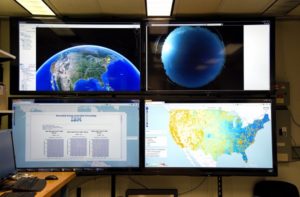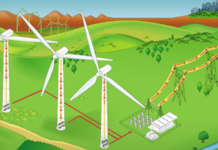
The SunShot Initiative’s Solar Forecasting program, launched in 2012, spearheaded a collaborative effort to develop real-world solutions to improve the accuracy, flexibility, and geospatial capabilities of solar forecasts. And now, the program and an Energy Department scientist are receiving the Utility Variable-Generation Integration Group’s 2017 Annual Achievement Awards, which honor energy professionals for their success in reliably and economically integrating renewable energy.
Tassos Golnas from SunShot, Hendrik Hamann and Siyuan Lu from IBM, Sue Haupt and Tara Jensen from the National Center for Atmospheric Research, Kathy Lantz, Eric James, and Joe Olson from the National Oceanic and Atmospheric Administration were recognized for advancing the state-of-the-art in solar energy forecasting.
A key to enabling grid operators to better manage distributed resources, advanced solar forecasting has been at the forefront of SunShot’s systems integration work.
Because solar production can be impacted by cloud coverage and stormy weather, it is often difficult for utilities and grid operators to predict solar generation levels. Utilities are charged with delivering electricity regardless of weather conditions, so it’s vital they have tools that help them understand grid impacts minutes, hours, and days ahead. When utilities can more accurately predict solar forecasts, they can ensure reliable and efficient integration of larger amounts of solar onto the grid.
By integrating cutting-edge weather modeling technology into grid operation systems, advancing solar radiation measurement and cloud tracking, and creating a new platform that uses machine learning to continually improve and adjust forecasts, the program laid the foundation for a technologically advanced approach to predicting solar generation levels.
Due to the successes of the Solar Forecasting funding program, SunShot announced a second round of funding last year.
Learn more about SunShot’s solar forecasting projects and the systems integration program.



















